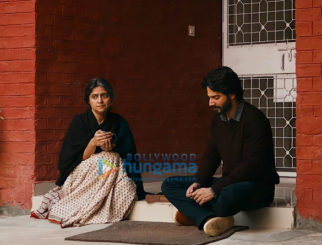 |
| Image Source - IMDb |
I have revisited Shoojit Sircar's exquisitely beautiful movie, October. The whole film unspools like poetry in motion. Each frame, each movement, each word adds to the lyrical quality of the touching film. And Shantanu Moitra's mellifluous background score brings it to life. I still can't get that haunting music out of my mind.
Whoever would have thought a mainstream film - about a sudden, freak accident that sends the lead actress into coma could be so very ephemeral, so lyrical? Most part of the movie unfolds in a hospital room, amidst catheters, ECG machines, drips, and hospital beds. Yet, the way the director has handled this serious theme is spectacular.
Celluloid lyricism, economy of expression
The director works his magic through poetic frames, expressions, seamless transitions, verbal and non-verbal imagery. His story is of an accident shattering lives, but his treatment is that of telling a lyrical poem. A poem of resilience, of fragility, of humaneness, of connections, of empathy. Of enduring courage and the invincibility of the human spirit.
Hospital scenes have never evoked such tenderness and unexpected humour. Telling a sombre story in such a gently philosophical, tragi-comic manner reveals the director's brilliance of style. So much is left unsaid, only suggested through hints, visual cues, haunting tunes. Knowing when to hold back is most difficult when you have so much to say.
Eliciting Superlative Performances
Who could have thought a mainstream actor with a macho image could deliver such a nuanced, underplayed performance! Sircar makes Varun Dhawan shed his machismo, his swag, his virile, confident image to morph into a bumbling, aggressive hotel trainee, whose life changes when a colleague falls from the hotel parapet. That the girl enquired about him before she fell makes it impossible for our man to detach himself. Initially reluctant, he gets sucked into the poignant fate that the girl has to endure.
The way the protagonist makes the hospital his nearly permanent abode, helping co-visitors with their prescriptions, requesting them to lift their feet for the janitor to work unhindered, keeping a track of what all is going on around the patient, speaking to random people and befriending them, you are reminded of the Hollywood film, Terminal, starring the impeccable Tom Hanks. Varun Dhawan is no Hanks, but what a performance he has given!
 |
| Image Source -The Indian Express |
And what can be said about Banita Sandhu! She delivers a knockout performance, emoting only through her expressive eyes. Conveying helplessness, anger, expectation, fondness, bitterness, even jealousy through her eyes, Sandhu embodies Shiuli, the girl who - like the October blossom, lives only for a limited period. As her mother says, the girl who loves the flower so much, that she has a tree planted in her yard, Shiuli has a transience, ephemeral existence. She gives joy in that brief existence, and dissipates once her time is over. Her fragrance permeates through the October nights, heralding autumn, Durga Puja and festivities.
A Must-See for Cinephiles
If you haven't seen October, you have missed a gem. Such films are made once in a lifetime. And for me, this would be the best in Sircar's oeuvre.
 |
| Image Source - Bollywood Hungama |
Each one of the actors contributes to creating a tapestry of images and expressions. Each one is superlative, whether it is Gitanjali Rao, Sahil Vedoliyaa, Prateek Kapoor, Isha Chaturvedi or Iteeva Pandey. Even the most small roles are impeccably performed.
The last scene is simply out-of-the-world heart-breaking, yet hopeful. Simply magical. Period.
Take a bow, Shoojit Sircar, Shantanu Moitra, Varun Dhawan, Banita Sandhu! You have created a masterpiece.
#OctoberMovie #PoetryOnScreen #SuperbFilmmaking #ShoojitSircar #ShantanuMoitra #VarunDhawan #BanitaSandhu
Comments
Post a Comment